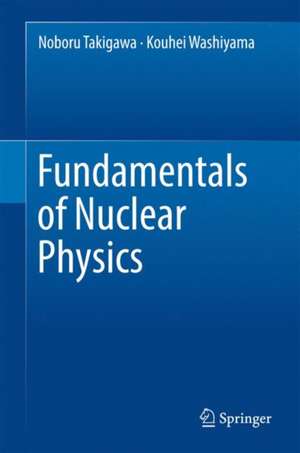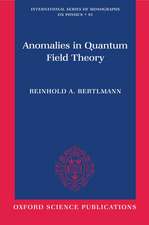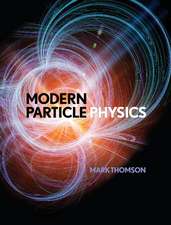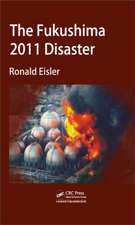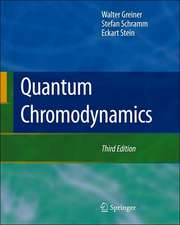Fundamentals of Nuclear Physics
Autor Noboru Takigawa, Kouhei Washiyamaen Limba Engleză Hardback – 18 ian 2017
It primarily covers the structure of nuclei at low excitation in detail. It also examines nuclear forces and decay properties. In addition to fundamentals, the book treats several new research areas such as non-relativistic as well as relativistic Hartree–Fock calculations, the synthesis of super-heavy elements, the quantum chromodynamics phase diagram, and nucleosynthesis in stars, to convey to readers the flavor of current research frontiers in nuclear physics. The authors explain semi-classical arguments and derivation of its formulae. In these ways an intuitive understanding of complex nuclear phenomena is provided.
The book is aimed at graduate school students as well as junior and senior undergraduate students and postdoctoral fellows. It is also useful for researchers to update their knowledge of diverse fields of nuclear structure. The book explains how basic physics such as quantum mechanics and statistical physics, as well as basic physical mathematics, is used to describe nuclear phenomena. A number of questions are given from place to place as supplements to the text.
| Toate formatele și edițiile | Preț | Express |
|---|---|---|
| Paperback (1) | 780.82 lei 6-8 săpt. | |
| Springer – 29 apr 2018 | 780.82 lei 6-8 săpt. | |
| Hardback (1) | 786.84 lei 6-8 săpt. | |
| Springer – 18 ian 2017 | 786.84 lei 6-8 săpt. |
Preț: 786.84 lei
Preț vechi: 959.56 lei
-18% Nou
Puncte Express: 1180
Preț estimativ în valută:
150.59€ • 156.61$ • 126.02£
150.59€ • 156.61$ • 126.02£
Carte tipărită la comandă
Livrare economică 14-28 martie
Preluare comenzi: 021 569.72.76
Specificații
ISBN-13: 9784431553779
ISBN-10: 4431553770
Pagini: 280
Ilustrații: XV, 269 p. 86 illus., 6 illus. in color.
Dimensiuni: 155 x 235 x 18 mm
Greutate: 0.58 kg
Ediția:1st ed. 2017
Editura: Springer
Colecția Springer
Locul publicării:Tokyo, Japan
ISBN-10: 4431553770
Pagini: 280
Ilustrații: XV, 269 p. 86 illus., 6 illus. in color.
Dimensiuni: 155 x 235 x 18 mm
Greutate: 0.58 kg
Ediția:1st ed. 2017
Editura: Springer
Colecția Springer
Locul publicării:Tokyo, Japan
Public țintă
ResearchCuprins
Introduction.- Bulk Properties of Nuclei.- The Nuclear Force and Two-Body Systems.- Interaction with Electromagnetic Field: Electromagnetic Moments.- Shell Structure.- Microscopic Mean-Field Theory (Hartree–Fock Theory).- The Shapes of Nuclei.- Nuclear Decay and Radioactivity.- Synthesis of Elements.
Notă biografică
Noboru Takigawa received his DSc in physics from the University of Tokyo in 1971. He subsequently worked as a postdoctoral researcher at the Institute for Nuclear Study of the University of Tokyo, 1971-1972, RIKEN, 1972-1973, Hahn Meitner Institut für Kernforschung Berlin GmbH, 1973-1975, the Technische Universität München, 1975, the University of Oxford, 1975-1976, the Institut de Physique Nucléaire d’Orsay of the Université Paris-Sud, 1976-1977, and the Universität Münster, 1977-1979. He served as a research associate (1979-1988) and as a professor of physics (1988-2007) at Tohoku University. Further, he has been a long-term visiting professor at the Technische Universität München, Academia Sinica at Taipei, Michigan State University, University of Wisconsin-Madison, University of Frankfurt, Université de Mons, Universidade de Sao Paulo, Australian National University, University of Catania, Institute for Nuclear Theory of the University of Washington, Tennessee Technological University and ECT* at Trento. He is now an emeritus professor at Tohoku University.
Kouhei Washiyama received his DSc in physics from Tohoku University in 2007, and thereafter worked as a postdoctoral researcher at Grand Accélérateur National d'Ions Lourds, Université Libre de Bruxelles, and RIKEN Nishina Center. He is currently a researcher at Center for Computational Sciences, University of Tsukuba.
Kouhei Washiyama received his DSc in physics from Tohoku University in 2007, and thereafter worked as a postdoctoral researcher at Grand Accélérateur National d'Ions Lourds, Université Libre de Bruxelles, and RIKEN Nishina Center. He is currently a researcher at Center for Computational Sciences, University of Tsukuba.
Textul de pe ultima copertă
This book introduces the current understanding of the fundamentals of nuclear physics by referring to key experimental data and by providing a theoretical understanding of principal nuclear properties.
It primarily covers the structure of nuclei at low excitation in detail. It also examines nuclear forces and decay properties. In addition to fundamentals, the book treats several new research areas such as non-relativistic as well as relativistic Hartree–Fock calculations, the synthesis of super-heavy elements, the quantum chromodynamics phase diagram, and nucleosynthesis in stars, to convey to readers the flavor of current research frontiers in nuclear physics. The authors explain semi-classical arguments and derivation of its formulae. In these ways an intuitive understanding of complex nuclear phenomena is provided.
The book is aimed at graduate school students as well as junior and senior undergraduate students and postdoctoral fellows. It is also useful for researchers to update their knowledge of diverse fields of nuclear structure. The book explains how basic physics such as quantum mechanics and statistical physics, as well as basic physical mathematics, is used to describe nuclear phenomena. A number of questions are given from place to place as supplements to the text.
It primarily covers the structure of nuclei at low excitation in detail. It also examines nuclear forces and decay properties. In addition to fundamentals, the book treats several new research areas such as non-relativistic as well as relativistic Hartree–Fock calculations, the synthesis of super-heavy elements, the quantum chromodynamics phase diagram, and nucleosynthesis in stars, to convey to readers the flavor of current research frontiers in nuclear physics. The authors explain semi-classical arguments and derivation of its formulae. In these ways an intuitive understanding of complex nuclear phenomena is provided.
The book is aimed at graduate school students as well as junior and senior undergraduate students and postdoctoral fellows. It is also useful for researchers to update their knowledge of diverse fields of nuclear structure. The book explains how basic physics such as quantum mechanics and statistical physics, as well as basic physical mathematics, is used to describe nuclear phenomena. A number of questions are given from place to place as supplements to the text.
Caracteristici
Provides updated principal experimental data as well as a basic theoretical understanding of those nuclear properties
Touches upon several new research areas and conveys the flavor of frontiers of current nuclear physics
Includes a detailed description of each subject and the derivation of formulae, together with supplementary questions and appendices
Reflects upon the recent progress of microscopic mean-field theory which has been studied by a density-functional approach for nuclei and nuclear matter
Includes supplementary material: sn.pub/extras
Touches upon several new research areas and conveys the flavor of frontiers of current nuclear physics
Includes a detailed description of each subject and the derivation of formulae, together with supplementary questions and appendices
Reflects upon the recent progress of microscopic mean-field theory which has been studied by a density-functional approach for nuclei and nuclear matter
Includes supplementary material: sn.pub/extras
